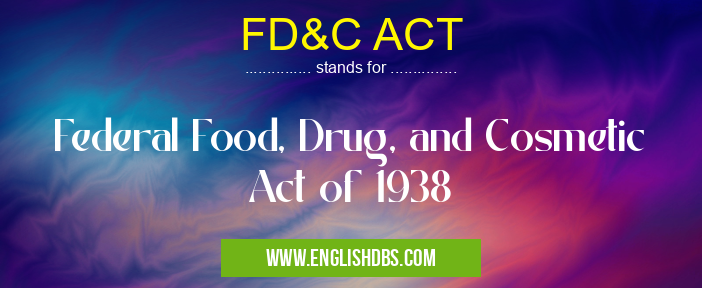What does FD&C ACT mean in FDA
The Federal Food, Drug, and Cosmetic Act (FD&C Act) was enacted in 1938, and is the primary law governing the regulation of food and drugs in the United States. The FD&C Act is a sweeping piece of legislation that covers a wide range of topics related to food, drugs, medical devices, cosmetics, dietary supplements, radiation-emitting products, veterinary medicine and more. As such it provides both broad definitions and specific requirements to ensure food and drug safety for consumers. In order to achieve its goals, the FD&C Act grants the Food & Drug Administration (FDA) authority in enforcing its provisions which are designed to protect public health by ensuring the safety, efficacy and security of human and veterinary drugs, biological products, medical devices as well as other therapeutic products intended for human use.

FD&C ACT meaning in FDA in Governmental
FD&C ACT mostly used in an acronym FDA in Category Governmental that means Federal Food, Drug, and Cosmetic Act of 1938
Shorthand: FD&C ACT,
Full Form: Federal Food, Drug, and Cosmetic Act of 1938
For more information of "Federal Food, Drug, and Cosmetic Act of 1938", see the section below.
» Governmental » FDA
Essential Questions and Answers on Federal Food, Drug, and Cosmetic Act of 1938 in "GOVERNMENTAL»FDA"
What is the FD&C Act?
The Federal Food, Drug, and Cosmetic Act of 1938 (FD&C Act) is a federal law that sets standards for food safety, drug safety and cosmetics in the United States. It requires the labels of all products to be honest and not misleading.
Who enforces the FD&C Act?
The U.S. Department of Health and Human Services (HHS), through its Food and Drug Administration (FDA), is responsible for enforcing the FD&C Act.
What does the FD&C Act regulate?
The FD&C Act regulates a wide range of products that are used by consumers on a daily basis. This includes foods, drugs, cosmetics, medical devices, dietary supplements, animal drugs, vaccines and biologics.
What types of manufacturers must comply with the FD&C Act?
All companies manufacturing or distributing any product regulated under the FD&C Act are required to meet FDA requirements and comply with applicable laws. These companies include manufacturers, importers, distributors and suppliers who market these products in interstate commerce in the United States.
Does the FD&C Act apply outside of the U.S.?
No, the FD&C does not apply outside of U.S territory or possesssions; however some foreign countries may require similar compliance standards from companies marketing their products within their borders.
What are FDA labeling requirements under the FD&C act?
Under provisions set out in section 502(a) of this act all food packaging must bear nutrition labeling that complies with applicable regulations issued by FDA as well as an accurate statement of ingredients in order to ensure truthful advertising practices.
How does FDA monitor compliance withthe FDC ACT?
The FDA monitors manufacturers’ compliance through periodic inspections as well as reviewinng reports submitted by companies about their own compliance status with regulations set out in this act.
Who can file a citizen petition if they have questions aboutthe FDC ACT?
Any individual or organization may file a citizen petition requesting that FDA take certain actions regarding a particular product or practice related to this act.
Final Words:
In summary, through its broad purview covering all matters relating to food and drugs within the United States along with its clear guidance on pre-marketing approval processes and higher standards when it comes to legal responsibility on behalf of manufacturers there can be no doubt that the Federal Food Drug & Cosmetic Act is one of our most important pieces of legislation when it comes to protecting public health in America. Thanks to its ongoing enforcement carried out by the FDA anyone knowing what FD&C stands for has at least some assurance that their next purchase will be safe from harm resulting from potential negligence or unchecked corporate profit motives.
